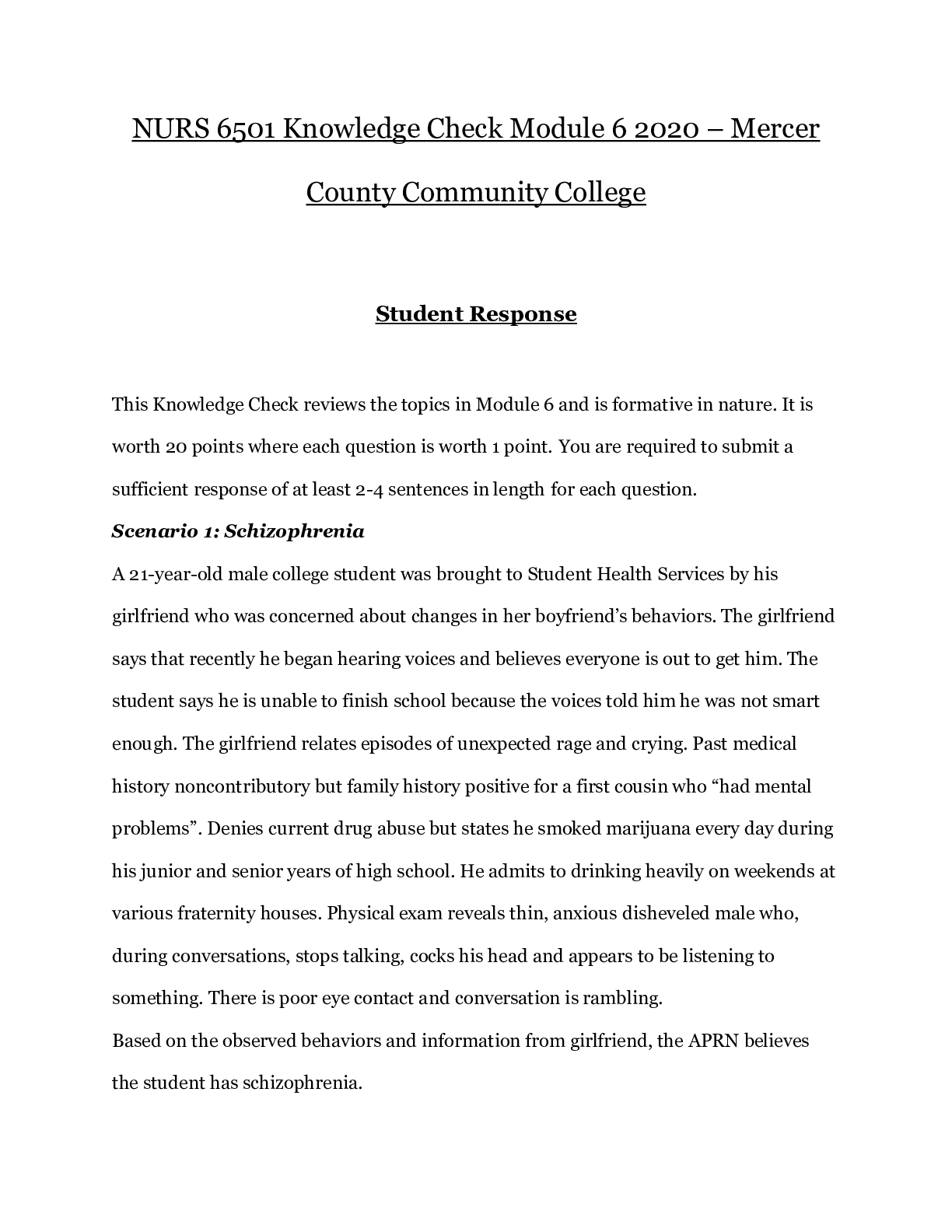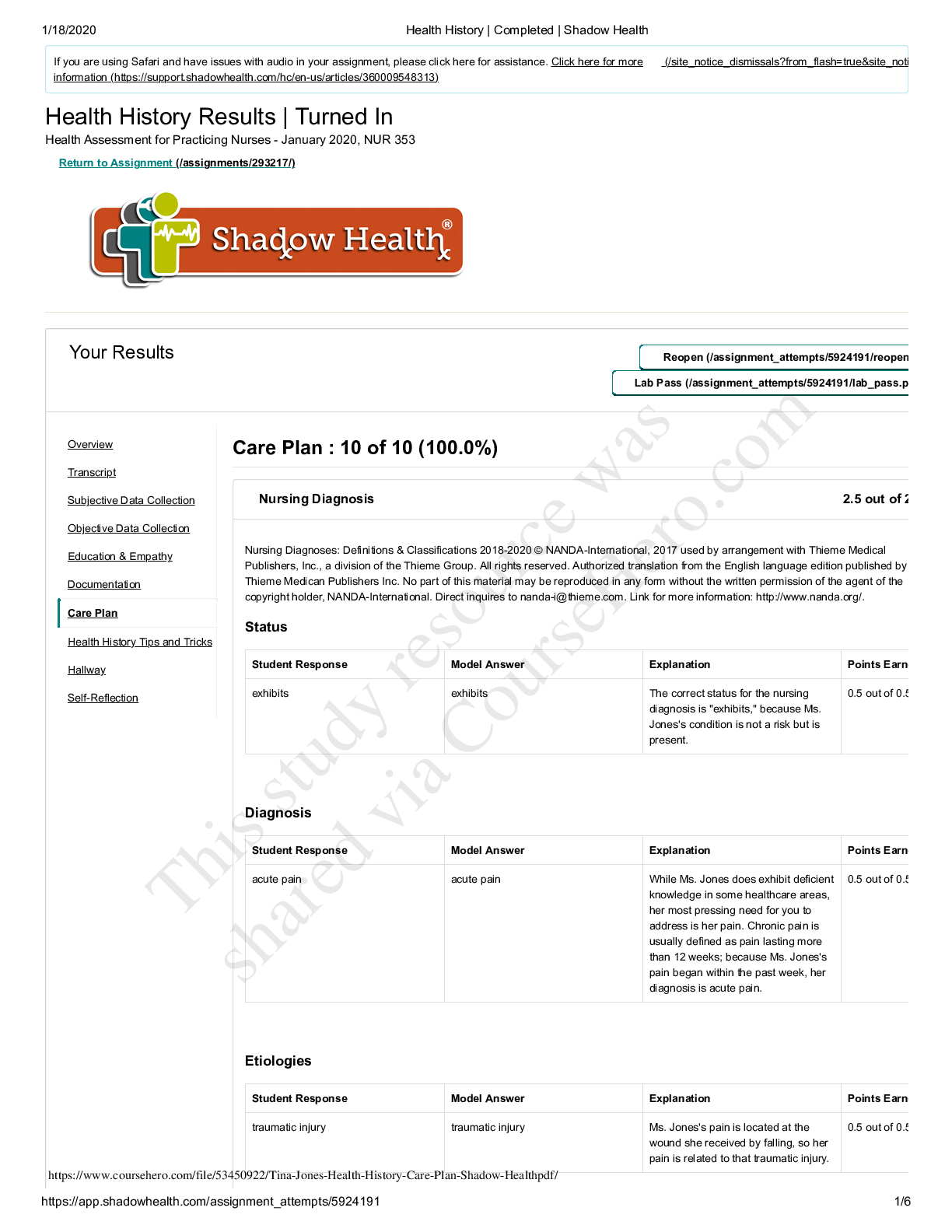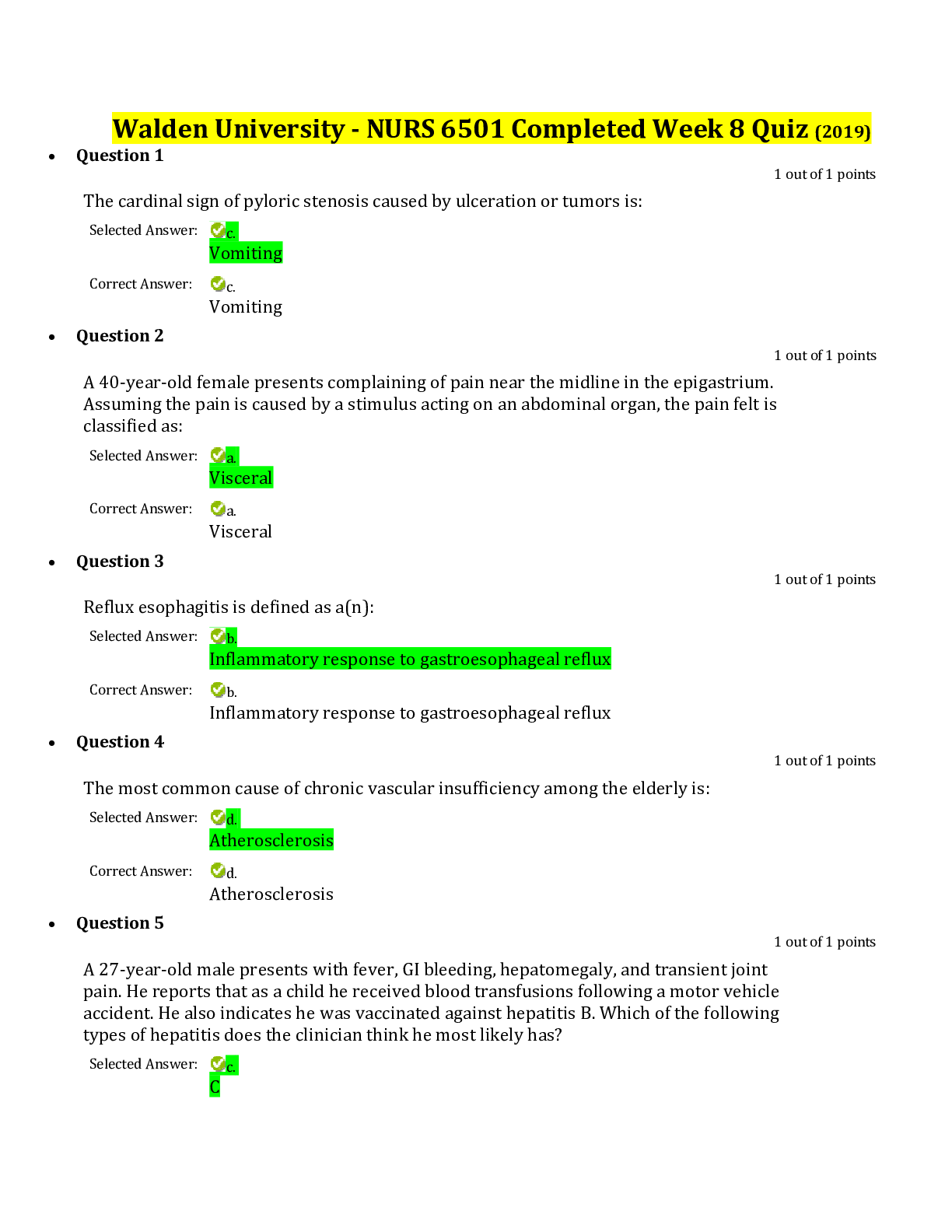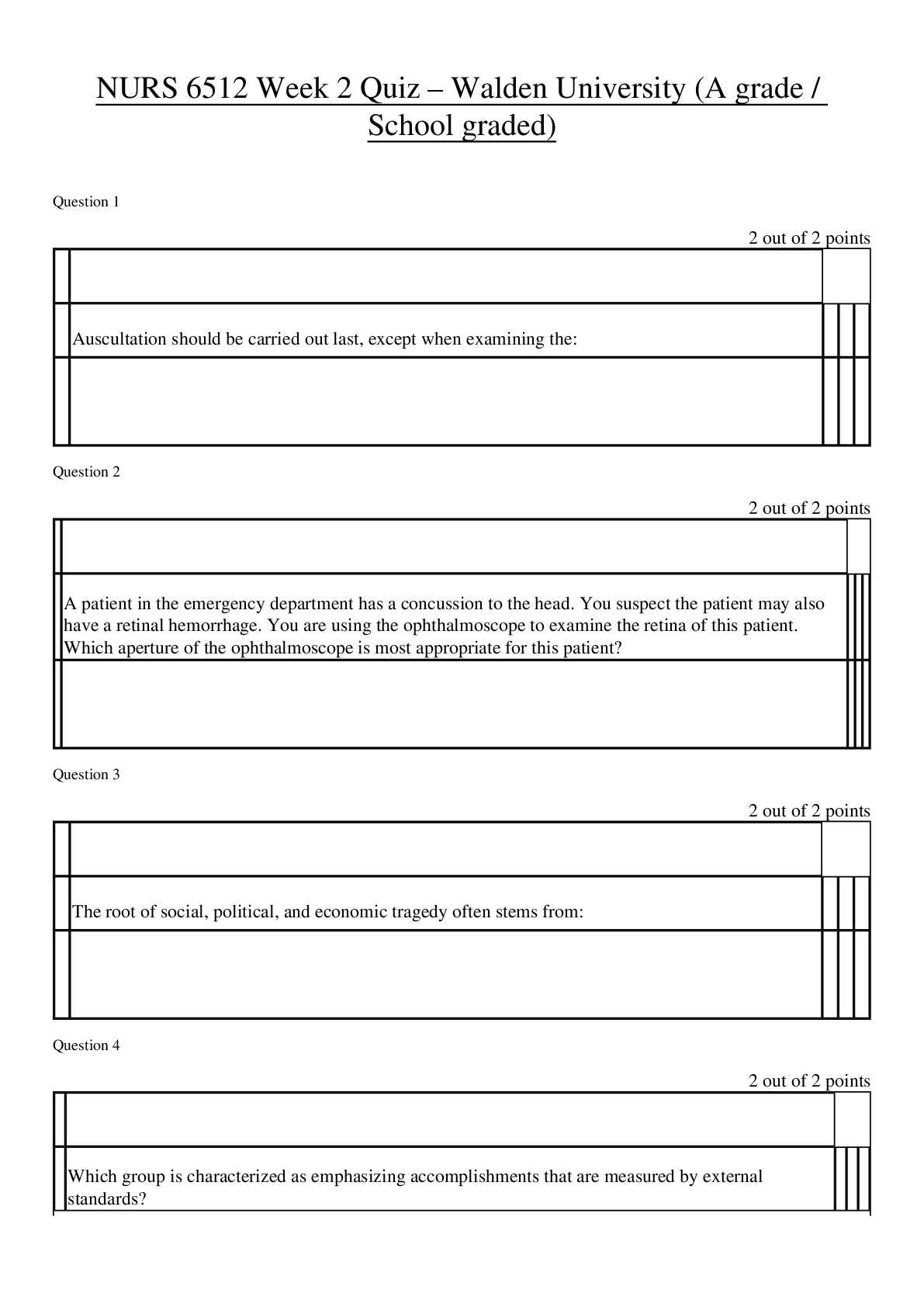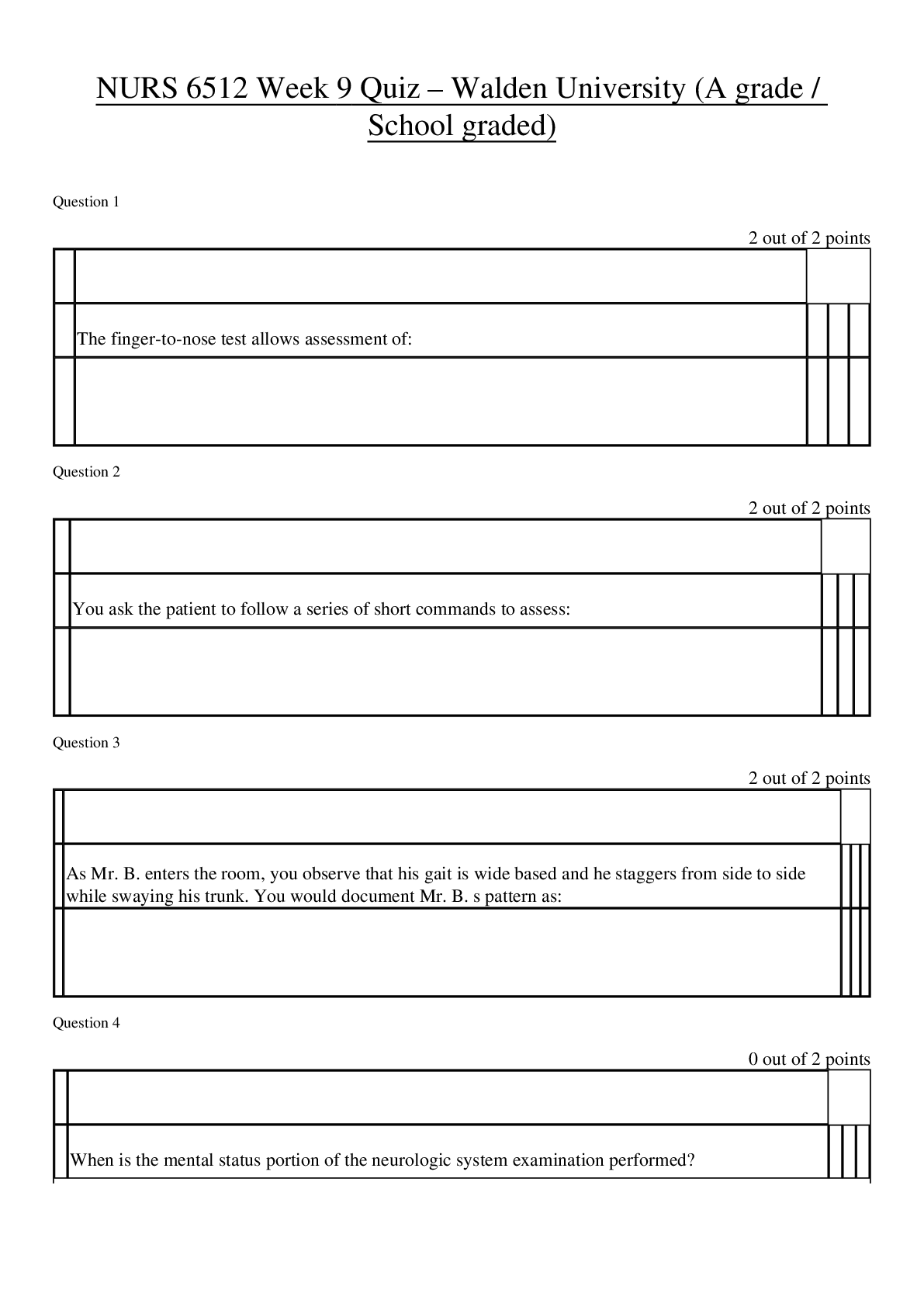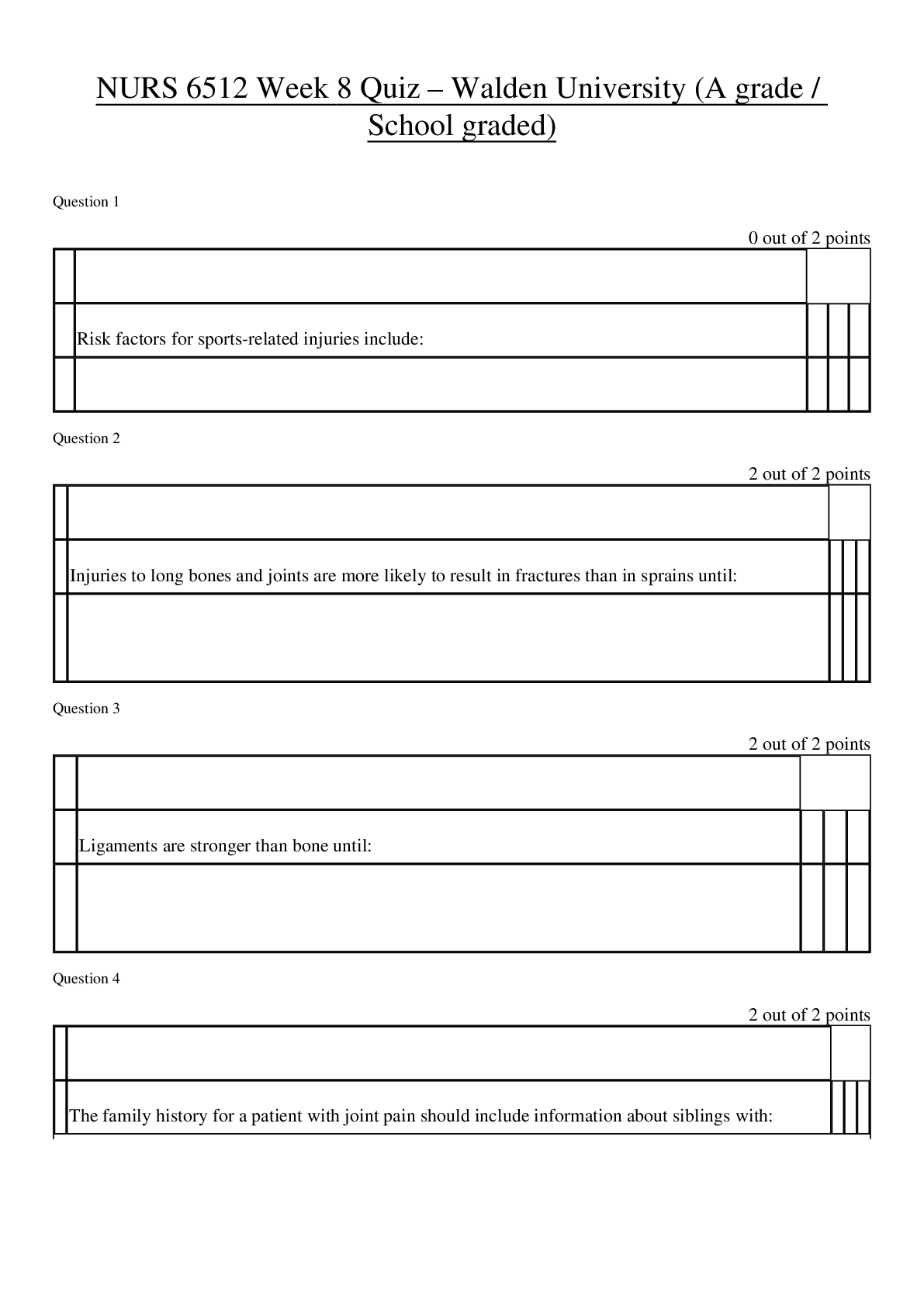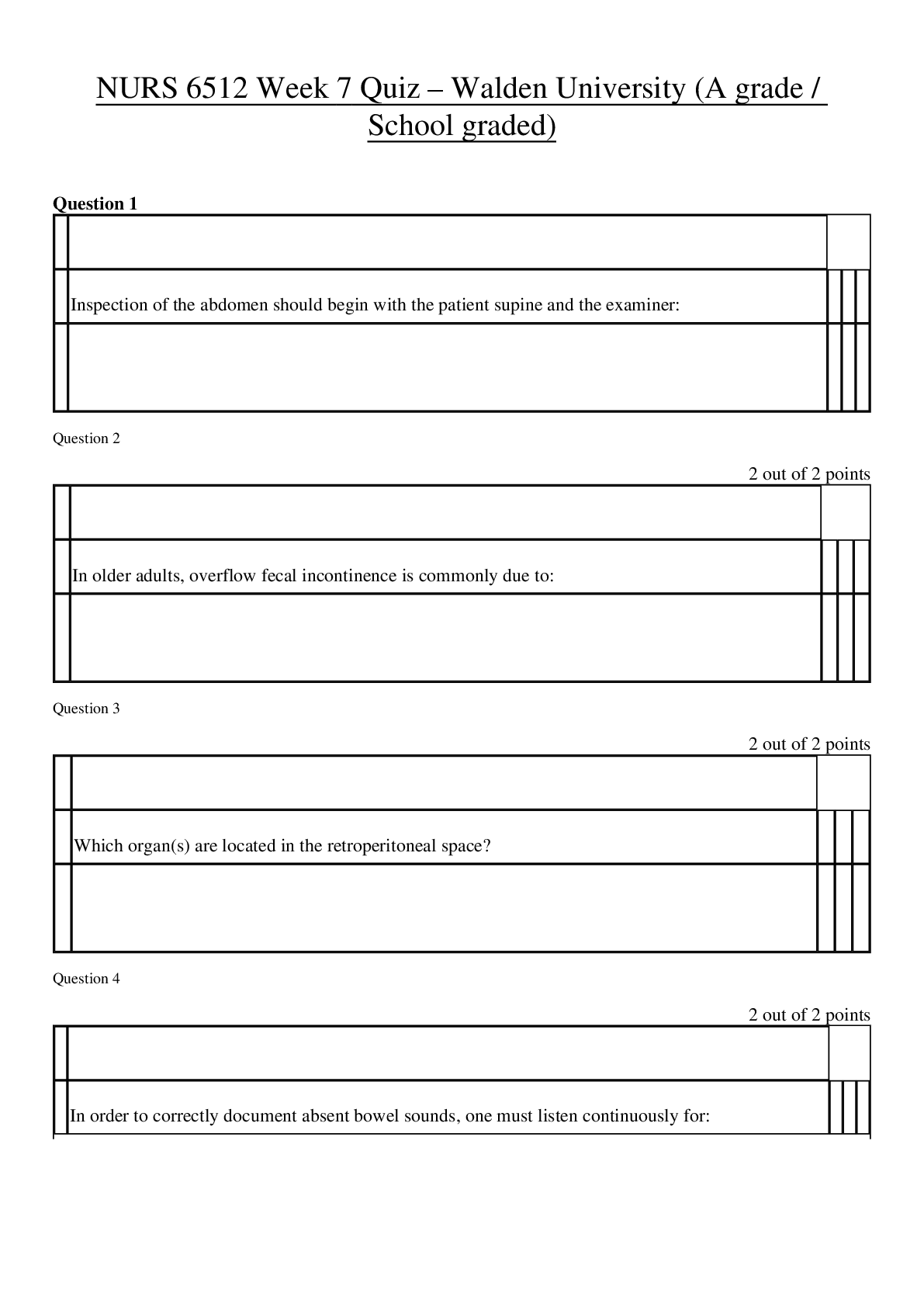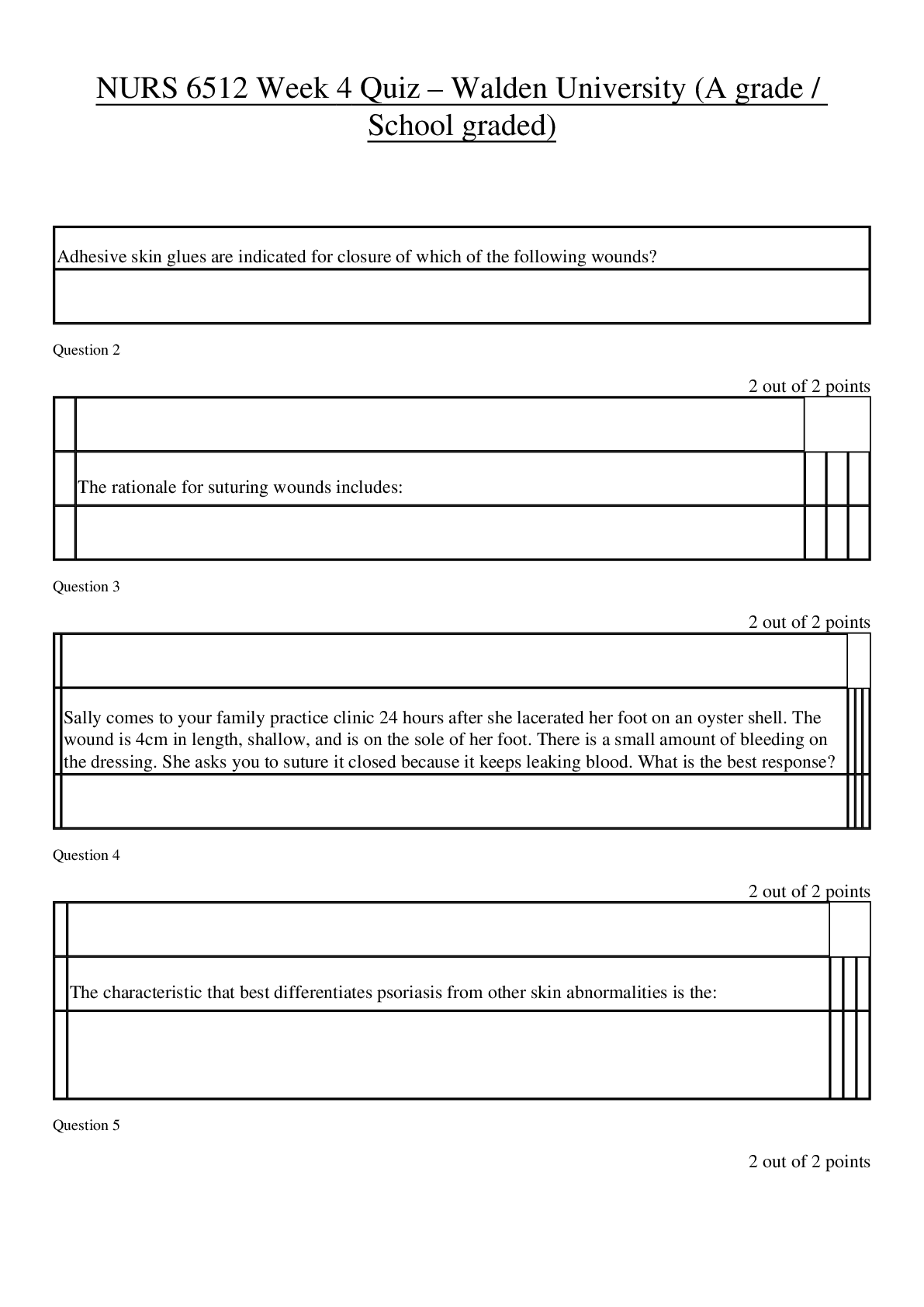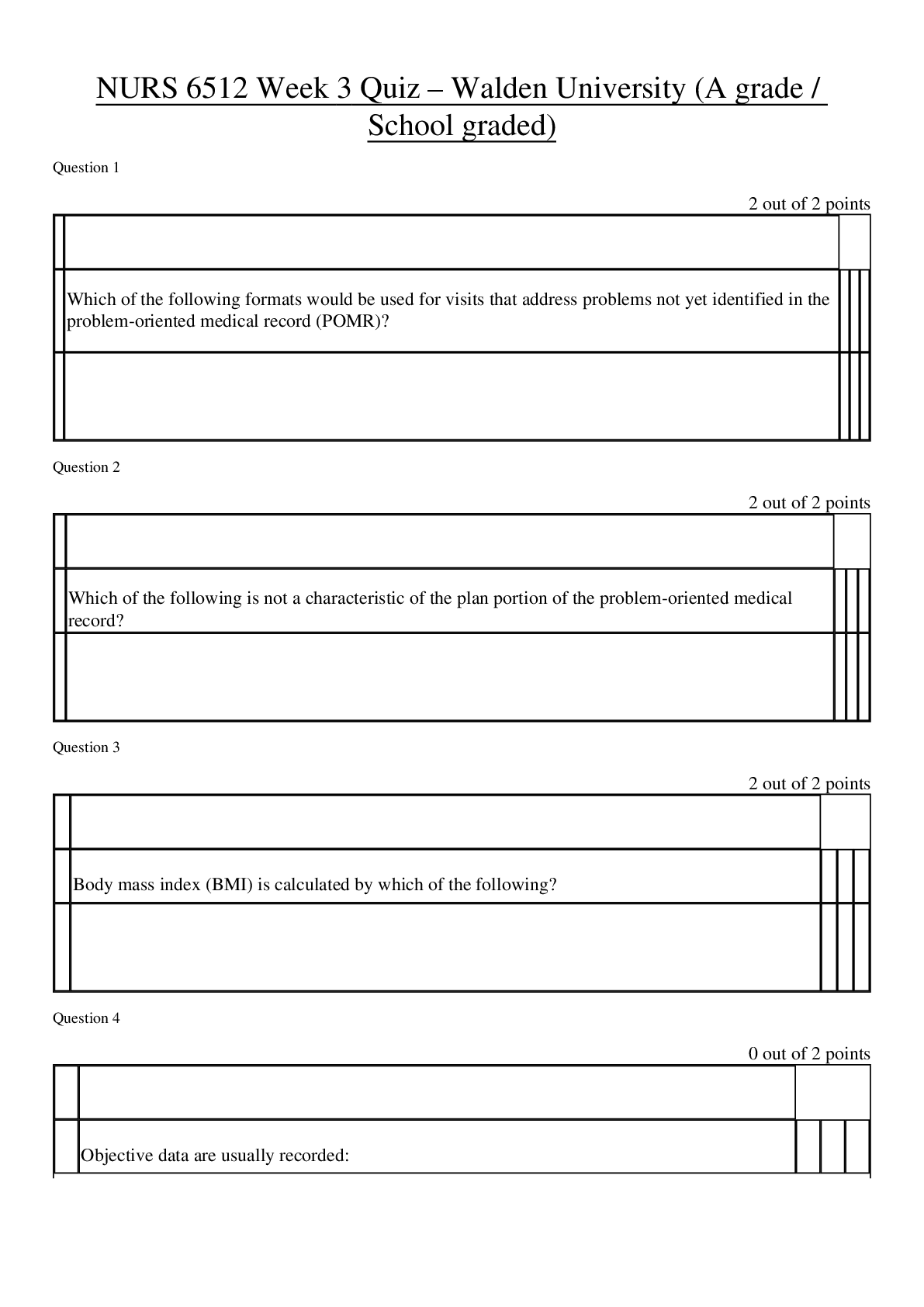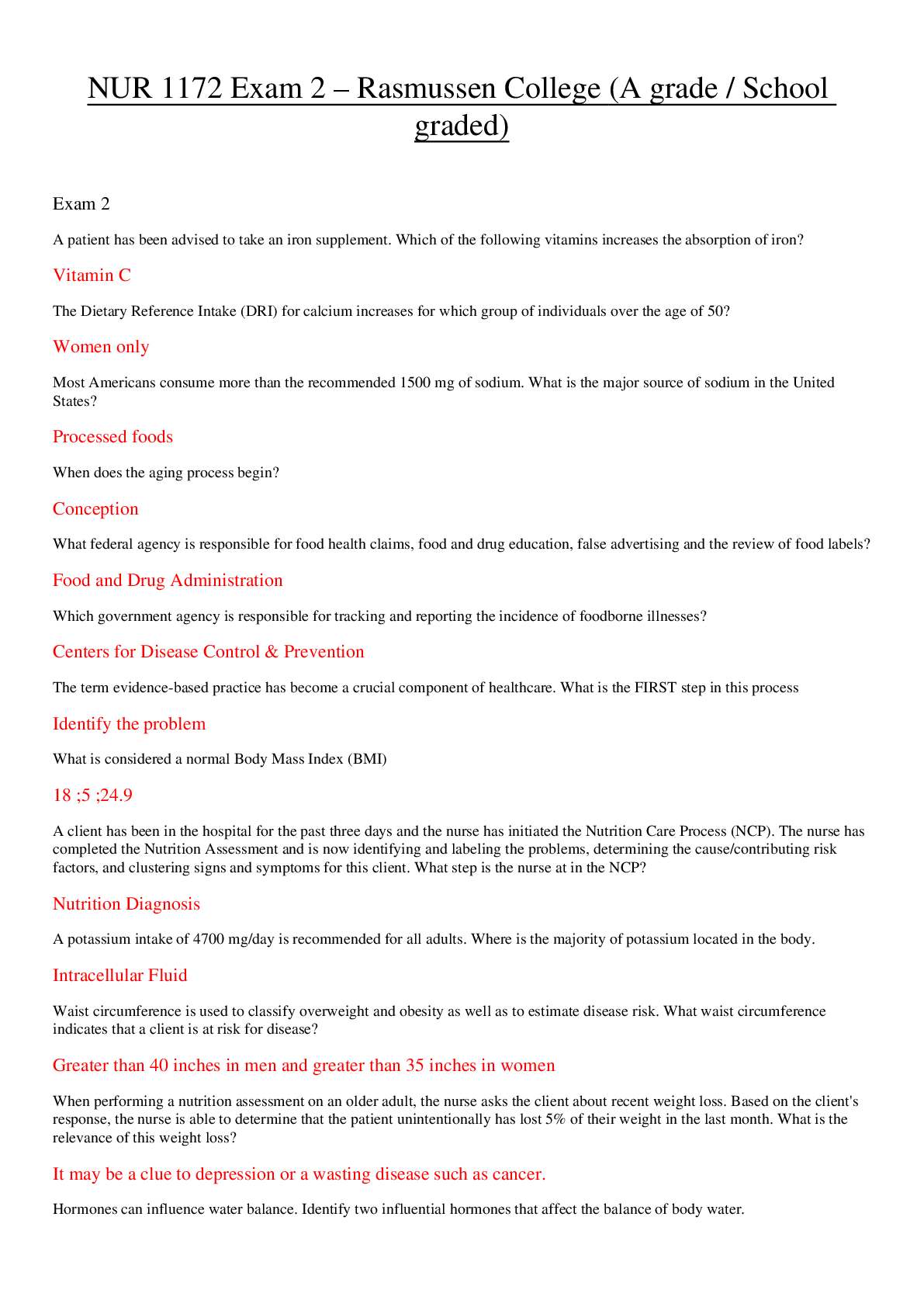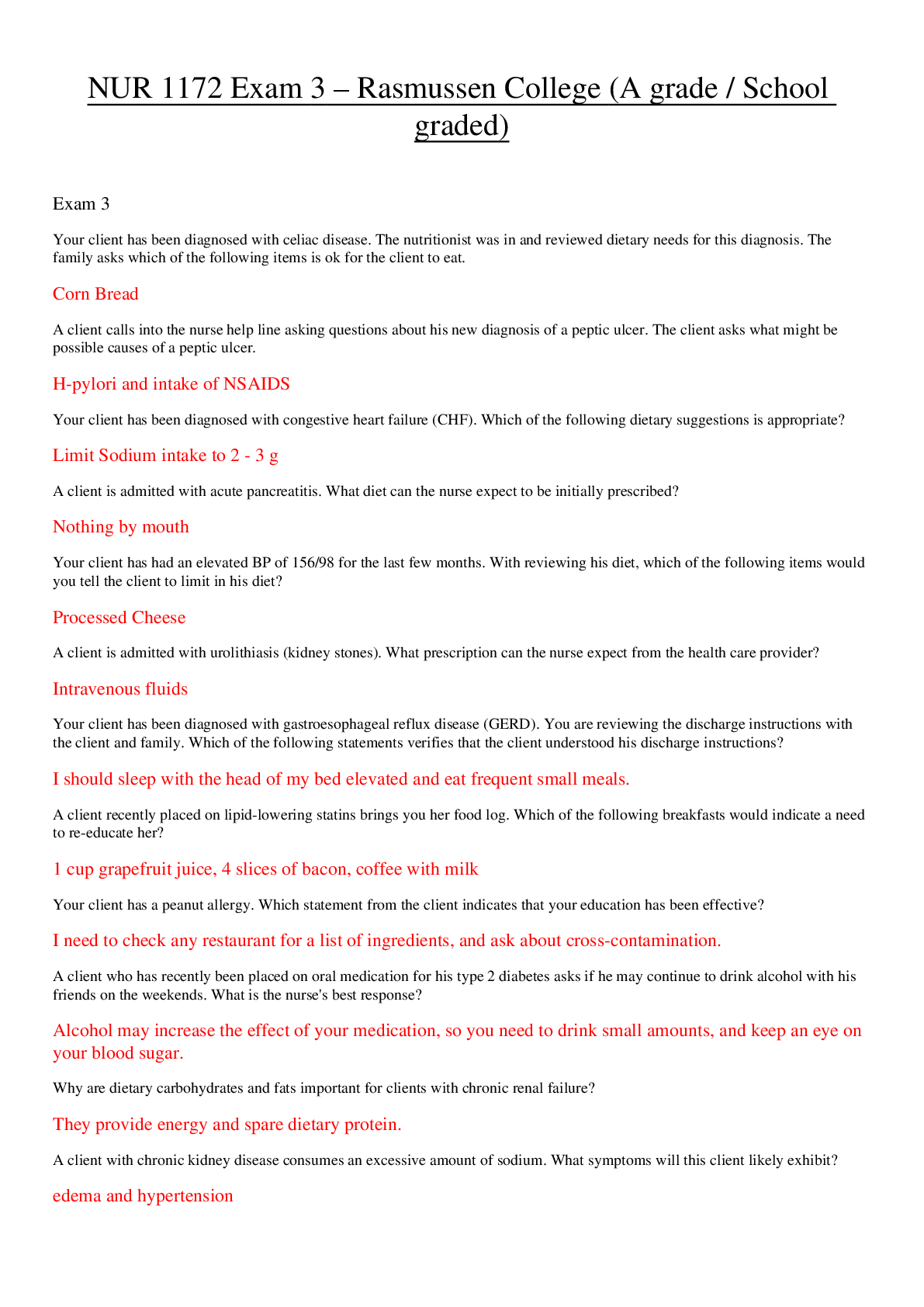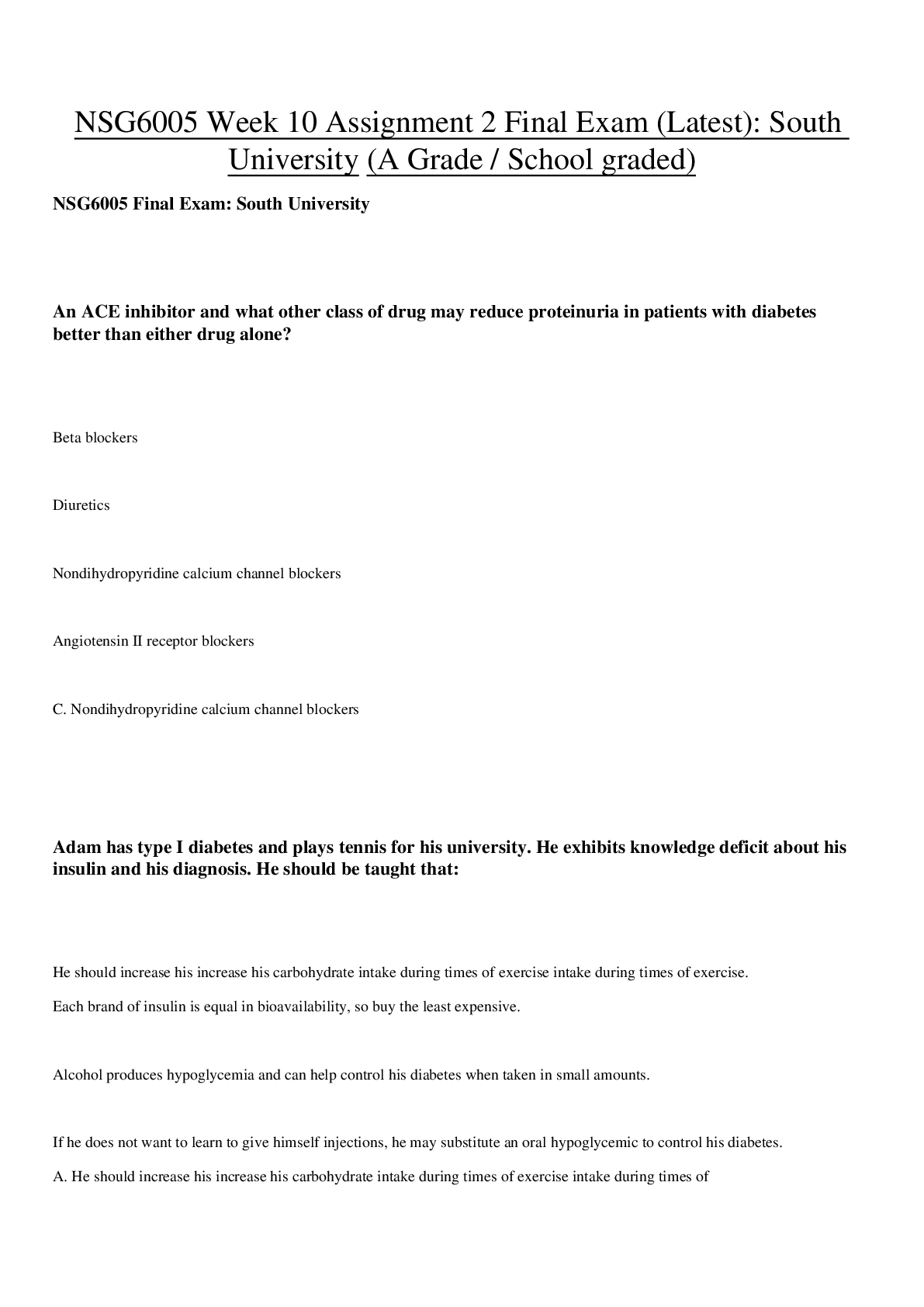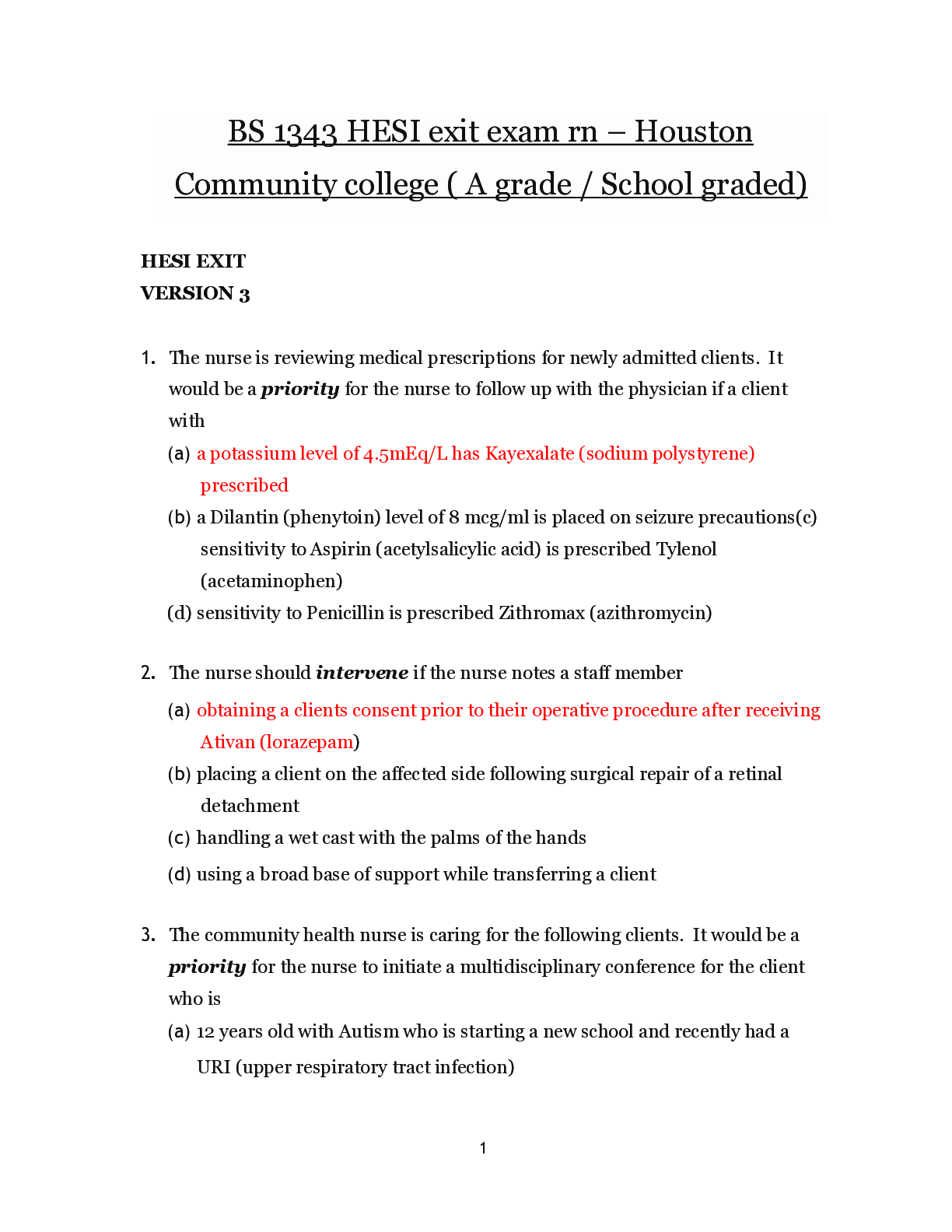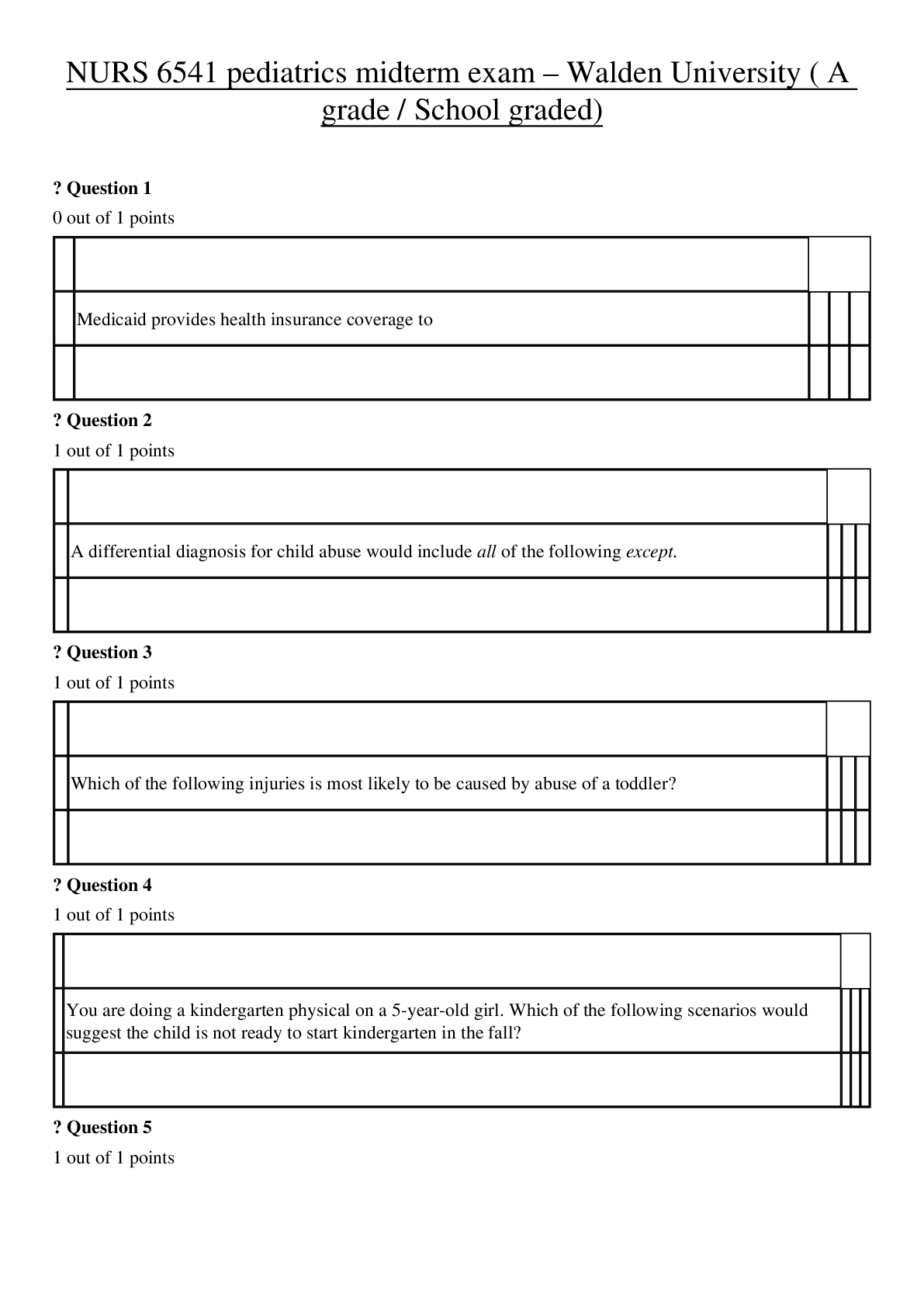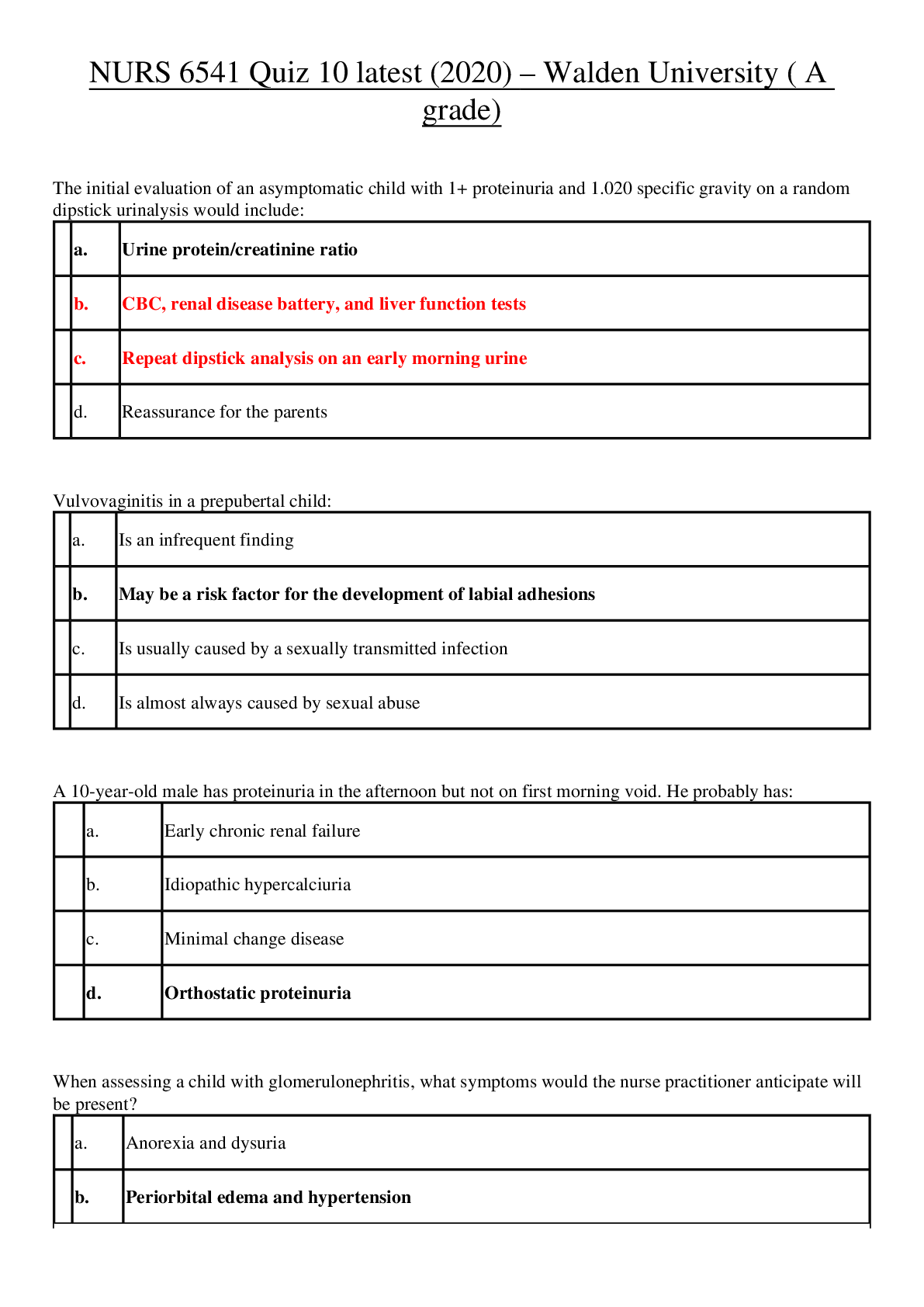*NURSING > EXAM > NURS 6541 Pediatrics Week 5 Quiz - Walden University ( A grade / School graded) (All)
NURS 6541 Pediatrics Week 5 Quiz - Walden University ( A grade / School graded)
Document Content and Description Below
NURS 6541 Pediatrics Week 5 Quiz - Walden University ( A grade / School graded) QUESTION 1 1. A 7-year-old presents to your office with several linear, curved lines approximately 4 millimeters in ... length that end in a papule. The lines are near the umbilicus and waist area. He complains about severe itching that is worse at night. You suspect: a. Scabies b. Hives c. Fleas d. Ticks 1 points QUESTION 2 1. You see a 10-year-old with warts on the hand. This is best treated with: a. Topical salicylic acid applied twice daily b. Podophyllum resin c. Referral to dermatology for removal d. Topical freezing of the warts and referral to dermatology if they do not respond 1 points QUESTION 3 1. Which of the following treatments is indicated for tinea versicolor? a. Mupirocin (Bactroban) topical ointment b. Cephalexin (Keflex) oral for 10 days c. Selenium sulfide 2.5% lotion (Selsun) d. Griseofulvin microsize oral until clear 1 points QUESTION 4 1. Jaime presents with lesions on his forearms. He was bit by mosquitos and he “just wouldn’t stop scratching them.” You notice two crusted lesions with erythematous bases on the lower portion of both arms. He also has two pustular lesions around his nose. What is the preferred therapy for this child? a. Topical neomycin-based antibiotic like Neosporin b. Topical antibiotic therapy with mupirocin (Bactroban) c. Oral antibiotic therapy with penicillin VK d. Oral antibiotic therapy with cephalexin (Keflex) 1 points QUESTION 5 1. A new mother is concerned about a strawberry hemangioma that her infant daughter has on the back of her neck. What is the treatment of choice for the majority of infants with hemangiomas? a. Cryosurgery b. Interlesional steroid injections c. Oral steroids d. Observation 1 points QUESTION 6 1. Michael is a 10-month-old with erythematous papular dermatitis on the face, scalp, and neck. His mother says he is constantly rubbing the skin. There is a strong family history of asthma and allergies. The most likely diagnosis is: a. Contact dermatitis b. Atopic dermatitis c. Seborrheic dermatitis d. Scabies infestation 1 points QUESTION 7 1. You see a 6-year-old who obtained a cut on his foot while walking barefoot. You diagnose cellulitis. He is up to date on his DTaP vaccine. There is a low-grade temperature and appears nontoxic. There is considerable pain when you palpate the foot. Which of the following treatments is best? a. Apply cool, moist compresses to the area to decrease pruritis and begin oral amoxicillin at 80 mg/kg/day. b. 2 c. Advise rest and immobilization, begin cephalexin (Keflex) or sulfamethoxazole/trimethoprim (Bactrim), and use warm moist compresses. d. Give acetaminophen for pain or fever and begin oral azithromycin (Zithromax). 1 points QUESTION 8 1. You receive a phone call from a mother of a 3-year-old who was diagnosed yesterday with molluscum contagiosum at a well-child visit. The mother was not at the visit and has questions about what type of treatment the child will need. Your best response is: a. There is low risk of communicability to others and the rash is self-limiting, so no treatment is necessary. b. The rash is highly contagious and the child should avoid contact with other children until the rash clears. c. Systemic involvement is common, so the child must be treated with oral antivirals like acyclovir. d. The child should be evaluated by a dermatologist because this disorder can cause long-term sequelae. 1 points QUESTION 9 1. You diagnose a 2-month-old with atopic dermatitis. She has an erythematous pruritic rash on her cheeks and scalp with ovoid patches on her trunk. What is the most important intervention at this time? a. Educate the parents this is a chronic disease she will likely have for the rest of her life. b. Discuss potential food triggers that should be avoided. c. Prescribe a medium potency topical corticosteroid. d. Emphasize the importance of consistent daily skin care with frequent bathing and emollient lotions. 1 points QUESTION 10 1. You diagnose a 14-year-old with tinea capitis. Which of the following treatments do you recommend? a. b. c. d. • Question 1 0 out of 1 points You see a 6-year-old who obtained a cut on his foot while walking barefoot. You diagnose cellulitis. He is up to date on his DTaP vaccine. There is a low-grade temperature and appears nontoxic. There is considerable pain when you palpate the foot. Which of the following treatments is best? • Question 2 0 out of 1 points You diagnose a 2-month-old with atopic dermatitis. She has an erythematous pruritic rash on her cheeks and scalp with ovoid patches on her trunk. What is the most important intervention at this time? • Question 3 0 out of 1 points Jaime presents with lesions on his forearms. He was bit by mosquitos and he “just wouldn’t stop scratching them.” You notice two crusted lesions with erythematous bases on the lower portion of both arms. He also has two pustular lesions around his nose. What is the preferred therapy for this child? • Question 4 1 out of 1 points You diagnose a 14-year-old with tinea capitis. Which of the following treatments do you recommend? • Question 5 1 out of 1 points A new mother is concerned about a strawberry hemangioma that her infant daughter has on the back of her neck. What is the treatment of choice for the majority of infants with hemangiomas? • Question 6 0 out of 1 points You receive a phone call from a mother of a 3-year-old who was diagnosed yesterday with molluscum contagiosum at a well-child visit. The mother was not at the visit and has questions about what type of treatment the child will need. Your best response is: • Question 7 1 out of 1 points A 7-year-old presents to your office with several linear, curved lines approximately 4 millimeters in length that end in a papule. The lines are near the umbilicus and waist area. He complains about severe itching that is worse at night. You suspect: • Question 8 1 out of 1 points Which of the following treatments is indicated for tinea versicolor? • Question 9 1 out of 1 points You see a 10-year-old with warts on the hand. This is best treated with: • Question 10 0 out of 1 points Michael is a 10-month-old with erythematous papular dermatitis on the face, scalp, and neck. His mother says he is constantly rubbing the skin. There is a strong family history of asthma and allergies. The most likely diagnosis is: [Show More]
Last updated: 1 year ago
Preview 1 out of pages

Reviews( 0 )
Document information
Connected school, study & course
About the document
Uploaded On
May 19, 2020
Number of pages
Written in
Additional information
This document has been written for:
Uploaded
May 19, 2020
Downloads
0
Views
15

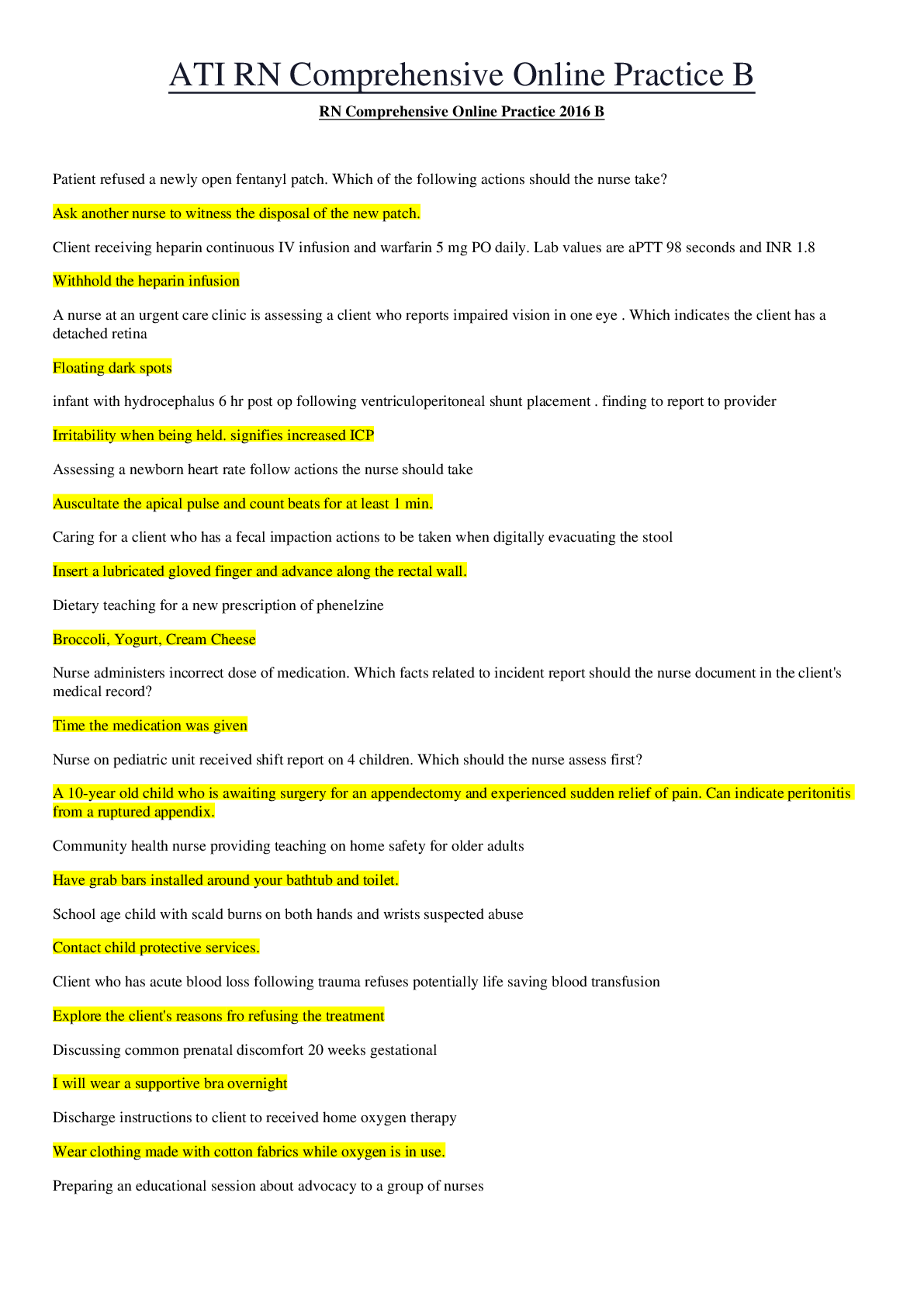
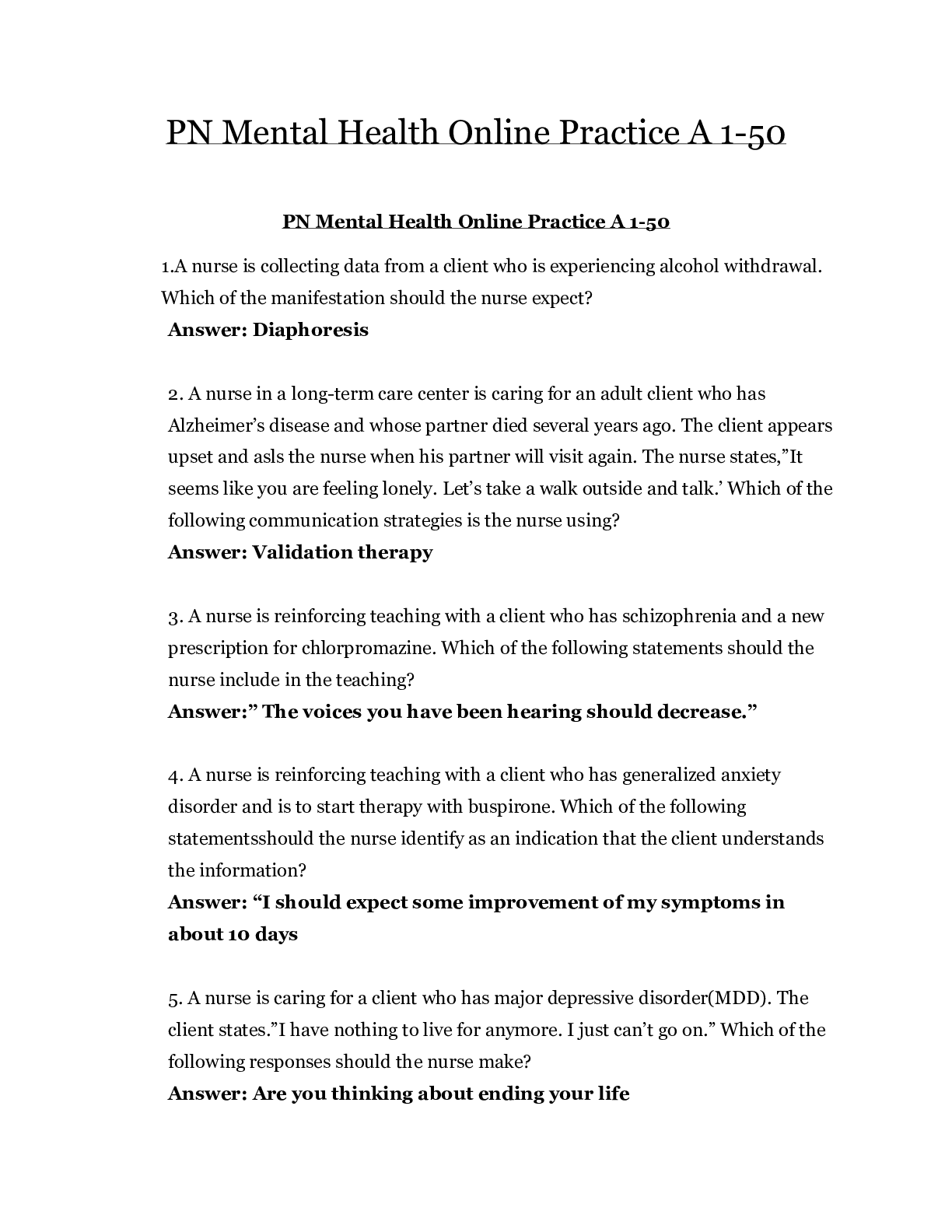
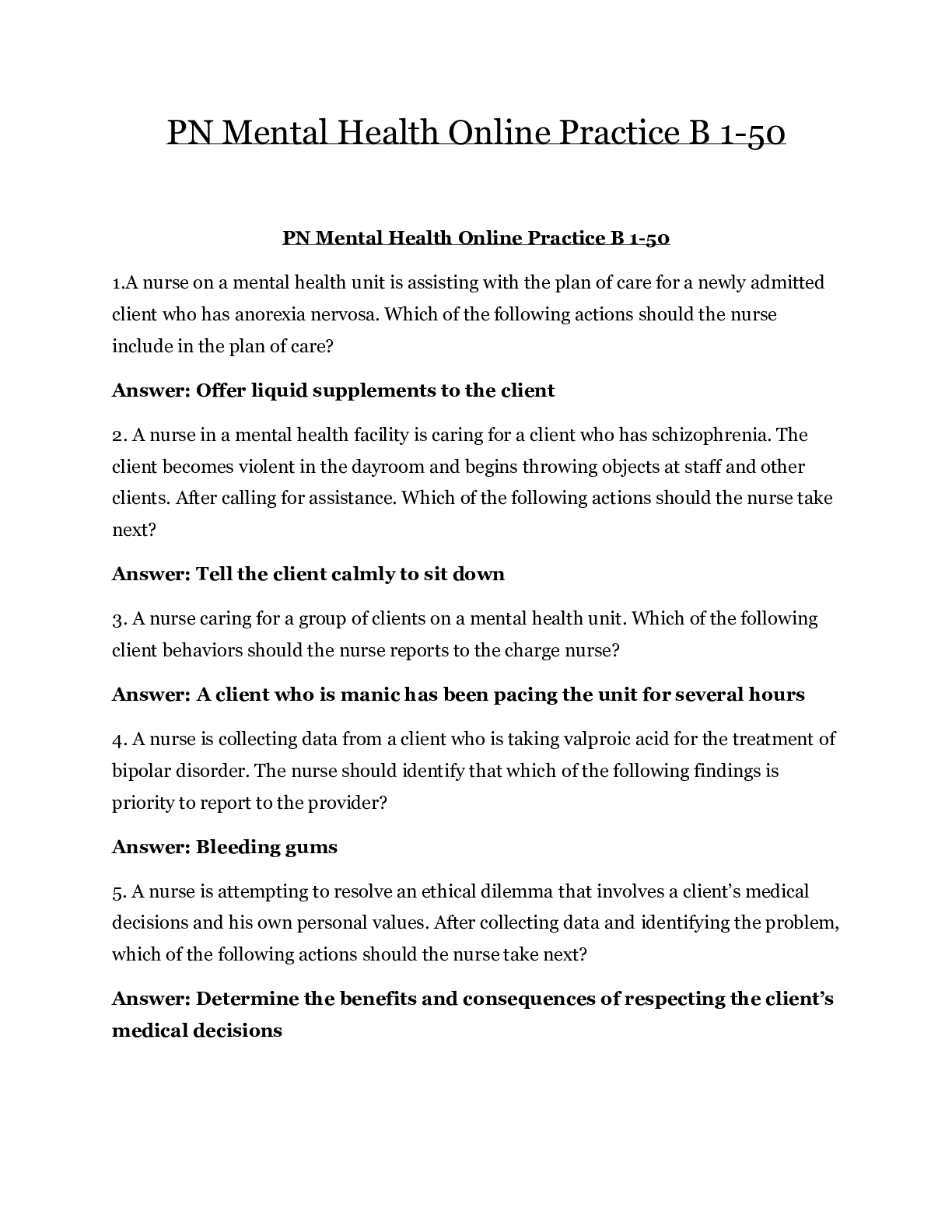
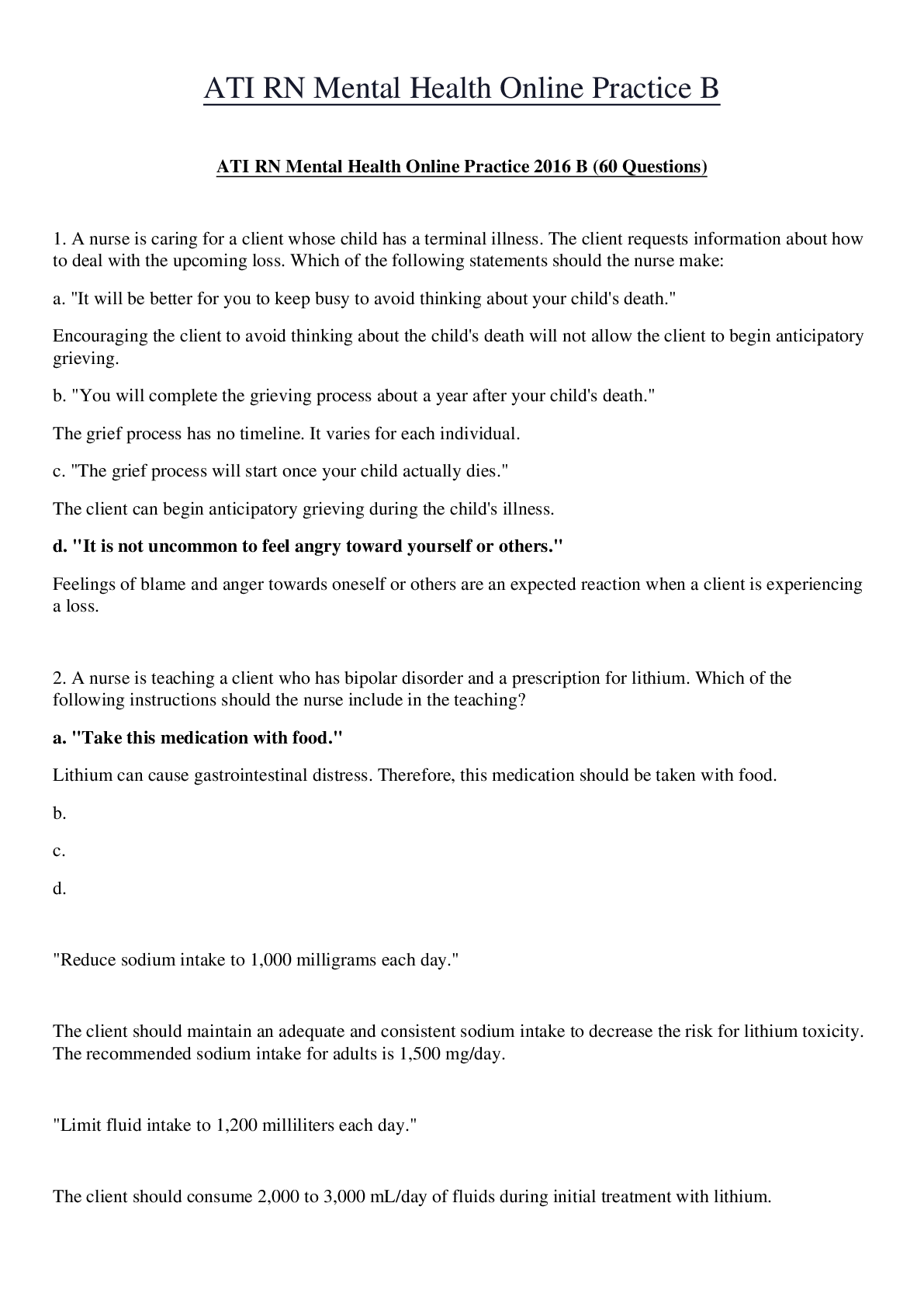
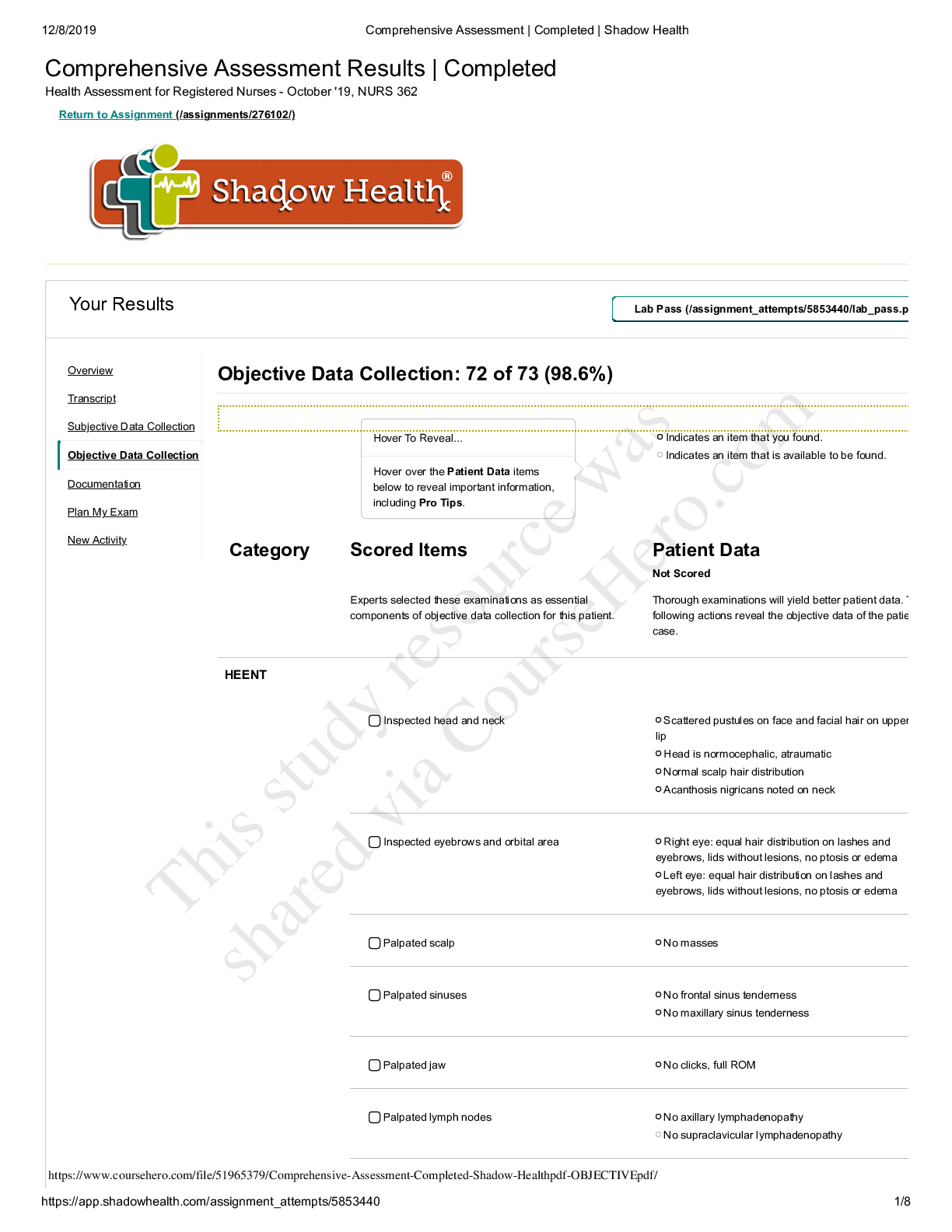

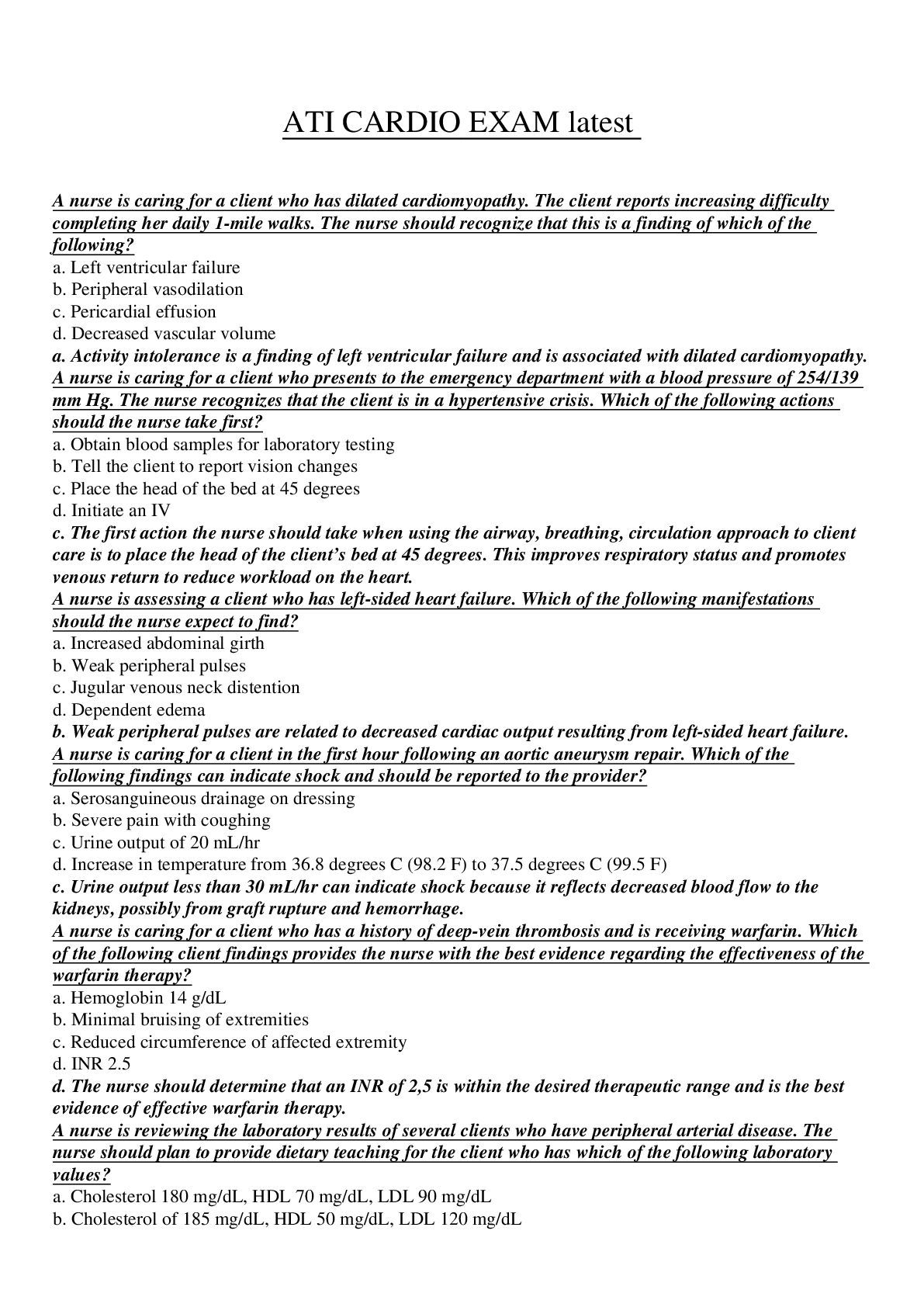
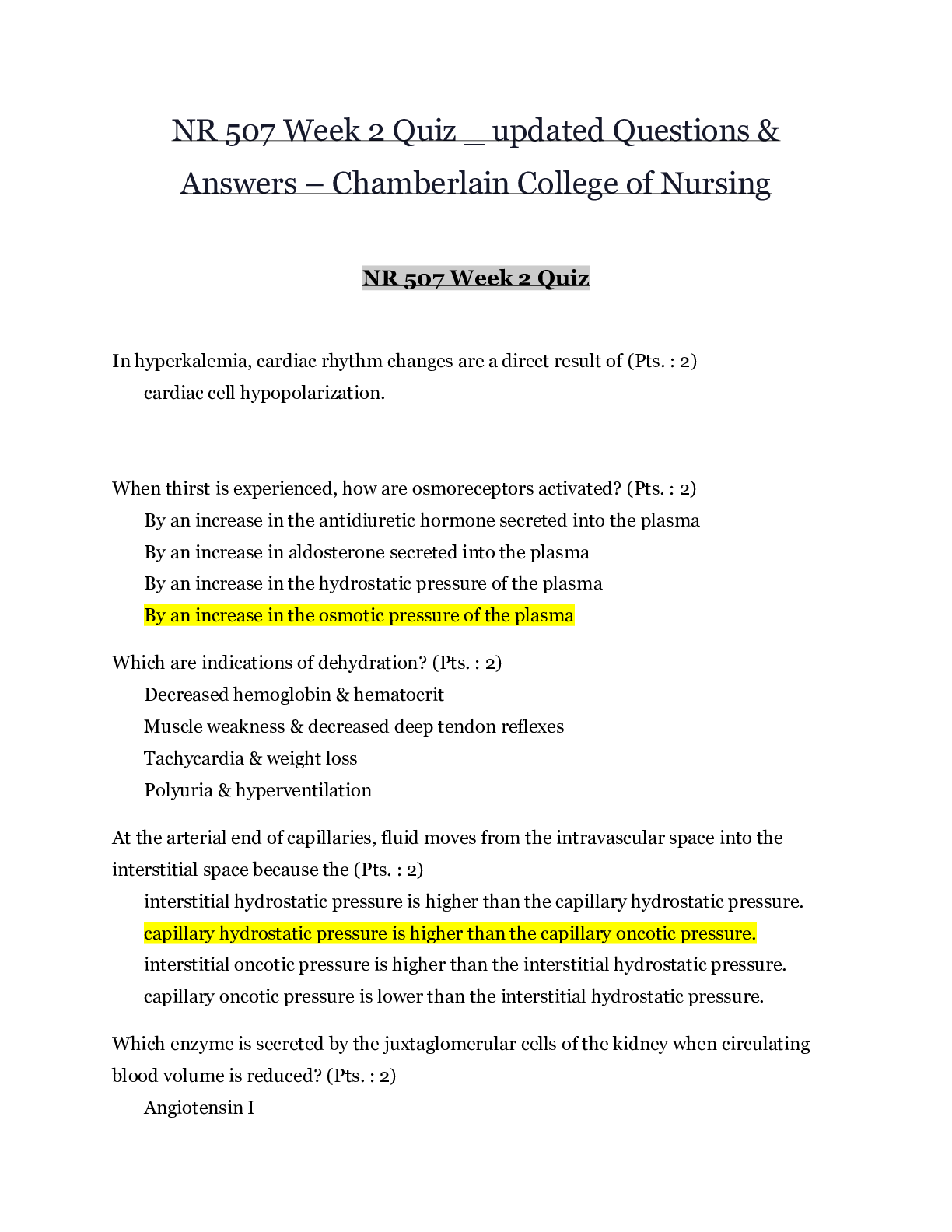
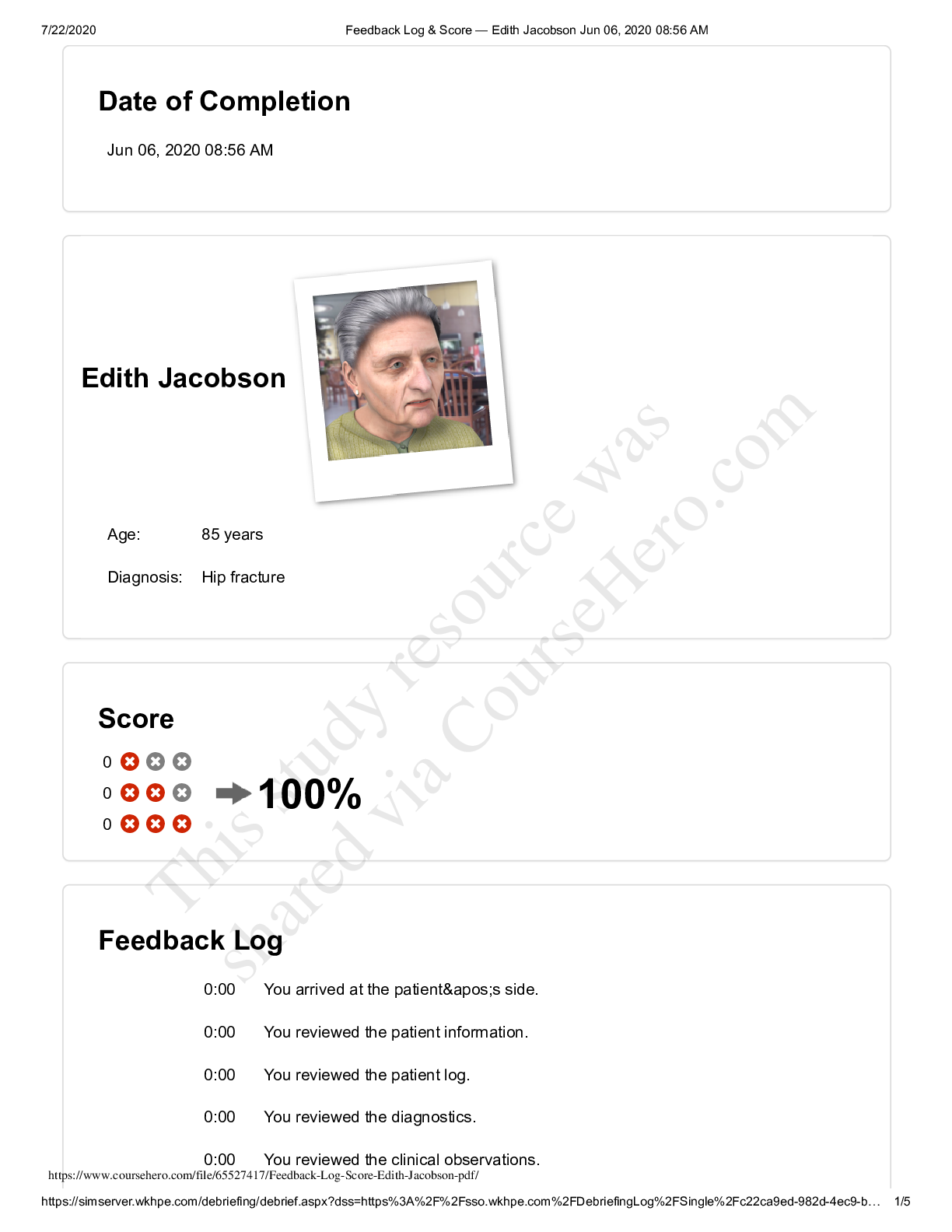
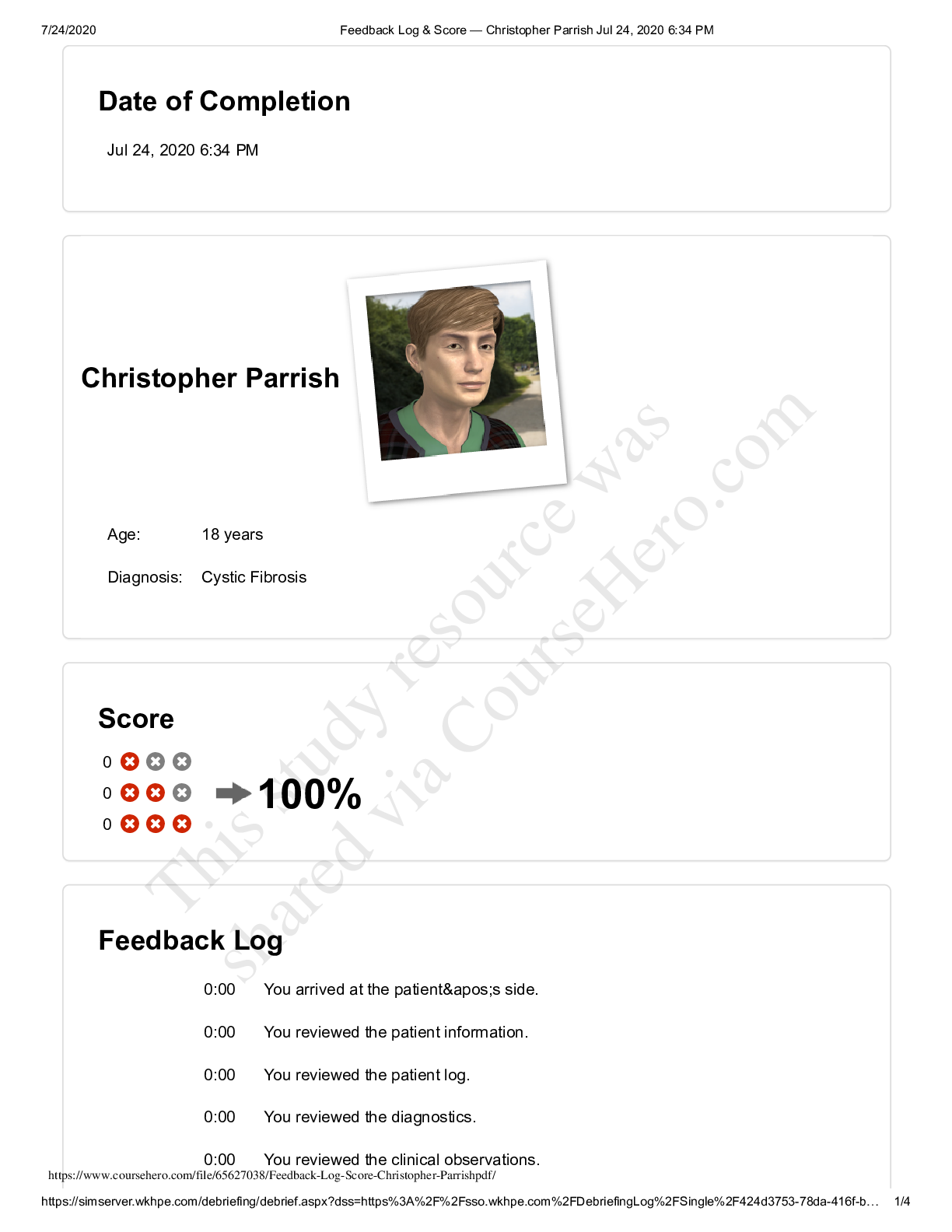
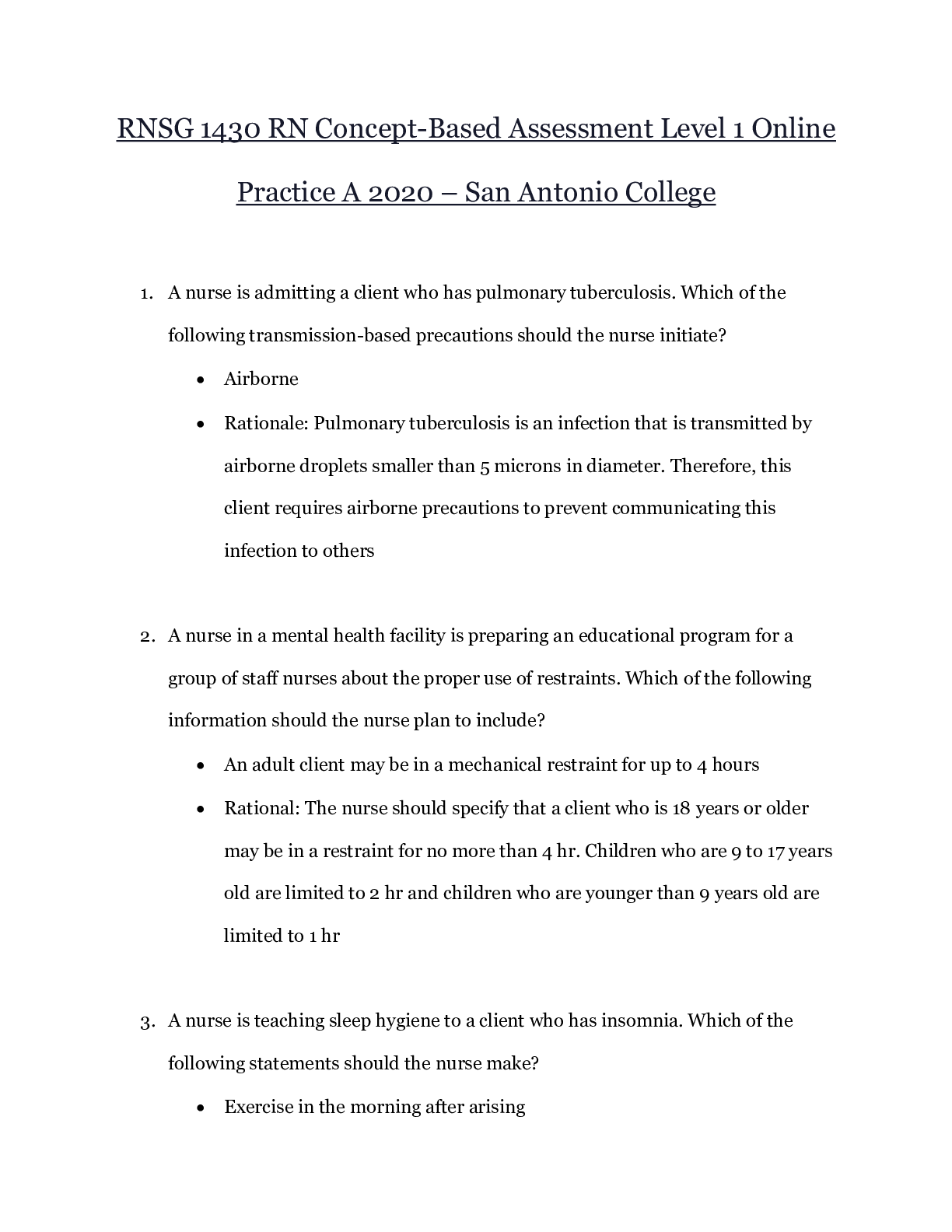
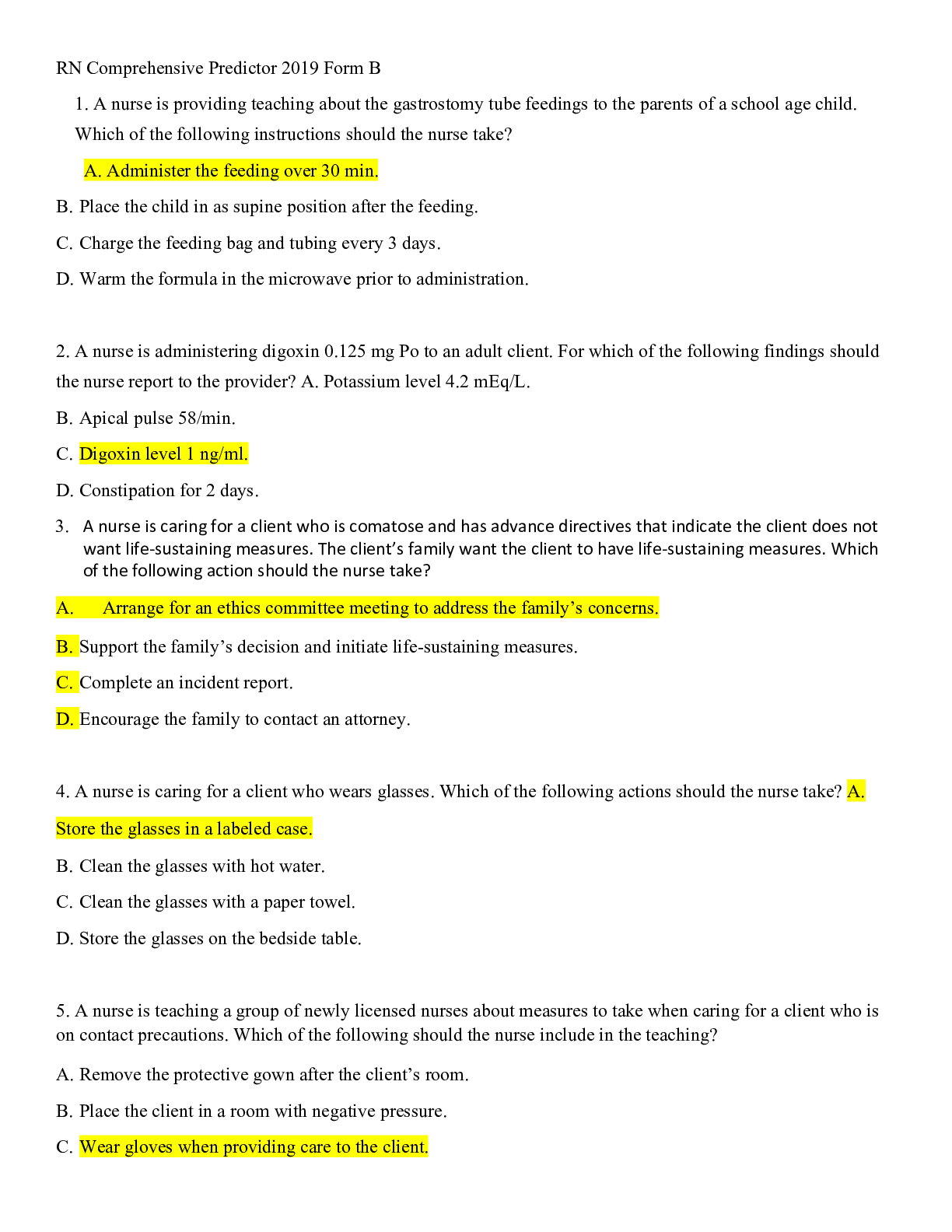

 – CHAMBERLAIN COLLEGE OF NURSING.png)
